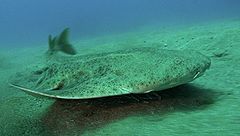Fishermen Reel In Rare Catch, “Could be last of its kind”
Fishermen have managed to reel in an edangered species of shark off Plymouth and experts are saying that it could be the very last of its kind swimming about the UK waterways. It very well might be. The angel shark is classified as a “critically endangered” species, and has been believed to be extinct in the North Sea, and is very nearly so in other areas of the Mediterranean. It is thought that there are large pockets of them floating around the Canary Islands, and many environmentalist groups are pushing for urgent action to prevent this magnificent species of shark from disappearing off the face of the planet.
The extraordinary catch, identified as an angel shark, was brought ashore to the Barbican Fish Quay market this past Tuesday.
Some resident experts at the Marine Aquarium has said that this is the first time an angel shark has made an appearance in a UK fish market since 1998.
In April of 2008, the UK Government granted the angel shark full protection under the Wildlife and Countryside Act. This means that it is illegal to fish them, trade them, export them, and sell them. However, the animal has yet to be added to the OSPAR Priority List of Threatened and Endangered Species, even though the proposal to get it on there was deemed appropriate the by Study Group on Elasmobranch Fishes, the general motion was quashed and the nomination rejected.
The fisherman who reeled in the shark, got into contact with the aquarium to tell them of the mistake – that they had inadvertently reeled in an angel shark which was about 1.2 meters in length.
An employee of the aquarium, John Crouch, explained: “Globally this species is listed as critically endangered and it was thought to have been fished to extinction in the North Sea in the 1990s.”
“This may well be the last of its species ever to been seen in UK waters.”
He went on to explain that this species of shark are especially vulnerable to accidental fishing, such as bottom trawling, because they generally prefer to make their homes in shallower waters closer to shore and are sometimes caught by any number of fisheries in the area.
He went on to add: “The angel shark is especially vulnerable due to its very long life span, around 35 years, and the fact that they do not mature until they are in their teens.”
“That’s a very long time to evade being caught when each fishable part of the North Sea is trawled seven times each year. It is thought that there are still populations of this species around the North of Africa and off the Canary Islands which is perhaps where this one came from.” John went on to explain that most of the native shark species have seen a recent decline of 90 percent since the 20th century began due to overfishing and hapless fishermen.
